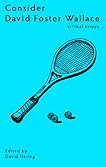 Consider David Foster Wallace: Critical Essays by David Hering
Consider David Foster Wallace: Critical Essays by David HeringMy rating: 2 of 5 stars
This volume of 17 essays on the work of David Foster Wallace synthesizes the proceedings of the "first ever conference devoted to the work of DFW", a 2-day workshop held on July 29-30, 2009 at the University of Liverpool in England. My first reaction was "God help us all! Now that the academicians have entered the field, they will suck all life out of his body of work and bicker querulously in the ashes".
It's not quite as bad as all that. Some of the essays in the book are definitely egregious crimes against language and the laws of nature. But not as many as you might expect. The truly dreadful stuff stays pretty much localized to five or six of the 17 contributors. Let's get this out of the way with one cheap shot (I can't resist).
Stuff like:
Unexpectedness also is a key feature of the referentiality of this particular footnote. Despite the fact that there is no sub-footnote anchor in footnote 6, footnote 6(A) can be considered to be also referring to the preceding note 6 on the basis of the numbering scheme. The narrative thus subtly and ambivalently simulates self-reflexivity as second-order narration.
One has to wonder what might drive a person to write a dissertation on the use of footnoting in the work of DFW. And how it might feel. Yes, I know -- it's unkind to mock the poor souls who feel forced to churn out that kind of stuff in their desperate pursuit of tenure, but surely patronizing to pretend that it's anything other than lethally boring.
If, like me, you're a general reader who just happens to like DFW's work a lot, your question may be whether the whole book is written in the peculiarly incomprehensible jargon used by academics when writing for other academics. Not entirely. About one third of the articles seemed indisputably like gibberish to me - simultaneously incomprehensible and worthless. Another third were a little heavy on the academic jargon at times, but at least one came away with the sense that the author may have had something useful to say. The remaining pieces would be accessible to anyone who had read the particular DFW work being discussed.
What aspects of the Wallace canon (besides his deployment of footnotes) have attracted the scrutiny of these bright young academic minds? A little of everything: several contributors examined the philosophical underpinnings of various works, others looked at the "new sincerity" DFW is alleged to have brought to the post-postmodern landscape, and at his effectiveness as a journalist and non-fiction reporter. These essays were generally relatively lucid and reasonably accessible.
As topics got more weirdly specific and arcane, intelligibility took a dive. Claims of similarity between DFW and Laurence Sterne were interesting, if not entirely persuasive. I certainly don't begrudge the editor (David Hering, a graduate student at Liverpool) the fun it must have been to work those Sierpinski gasket diagrams into his paper. A fractal analysis of Infinite Jest? Why not?
Connie Luther, in contrast, trod much more treacherous ground in her efforts to provide a mathematical analysis of the deforming function of post-modernity (sic). Some exercises are best left to the mathematical professional, or - better yet - not undertaken at all. Because they are fundamentally BOGUS. Kiki Benzon just disappears into the morass altogether, with her muddled prose and her fatal tendency to bandy around terms like orderly-disorder, chaotic indeterminacy, strange loops, intermediariness, turbulent flow, as if she knew what they meant. Matt Tresco's willingness to make sweeping generalizations about autism, schizophrenia, and other mental disorders was startling, but not in a good way. Finally, what to make of Gregory Phipps's insistence on reading layer after layer of meaning into the behavior of John Wayne, the only Canadian student at Enfield (the tennis academy in Infinite Jest)? Gregory is pursuing a degree at Magill - should his contribution be regarded as some kind of French Canadian rebuttal? His essay is singularly odd.
Because I have a very low tolerance for academic bullshit, I thought this book would upset me more than it did. But several of the essays were at least readable, and the better ones left me eager to revisit the work in question. Which is, I think, a marker of some degree of success. So I rate this 2.5 stars out of 5, rounded down to 2, because I recognize that DFW is not for everybody, something which must be true a fortiori about academic analyses of his work.
View all my reviews

No comments:
Post a Comment